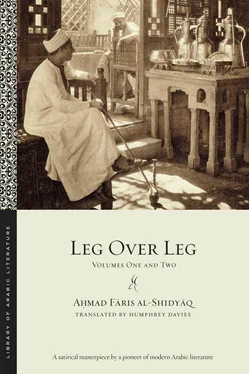and ʿamār ,
“the sweet-smelling plants with which the place where men meet to drink is decorated”
and ʿanbar ,
“the dung of a sea creature, or a substance thrown up by a spring in the sea”
and gharrāʾ ,
“a scented plant, or it may be that the correct form is ghurayrā ʾ”
2.16.24
and fāghirah ,
“a perfume, or cubeb”
and quṭr ,
“aloe used for censing”
and kāfūr ,
“a scented plant whose flowers are like camo-mile and palm blossom, or the spadix of the latter, or a perfume too well known to require definition; it comes from trees in the mountains of the Sea of India and from China”
and nisrīn ,
[“eglantine”] “a flower too well known to require definition”
and ʿajūz ,
“a sort of perfume”
and balasān ,
“small trees like those of henna that grow only in ʿAyn Shams, the Cairo suburb, and whose oil is much in demand”
and qalasān ,
“a sweet-smelling plant”
and qanas ,
“a sweet-smelling plant, also called rāsan ”
and habas ,
“gillyflower, also called manthūr and nammām ”
and mardaqūsh ,
“a perfume a woman puts on her comb”
and ḥuṣṣ ,
“Indian yellow, or saffron”
2.16.25
and saʿīṭ ,
“the ben tree, or mustard oil”
and qusṭ ,
“Indian or Arabian aloe”
and ḍiyāʿ ,
“a kind of perfume”
and mayʿah ,
“an aromatic substance; synonym māʾiʿah ”
and naqūʿ ,
“a dye containing sweet-smelling aromatics”
and ʿawf ,
“a sweet-smelling plant”
and khilāq ,
“a kind of perfume”
and raḥīq ,
“a kind of perfume”
and bunk ,
“a perfume too well known to require definition”
and sukk ,
“a perfume made from rāmik ” 626
2.16.26
and misk mashmūʿ ,
[literally, “waxed musk”] i.e., “mixed with amber”
and tatl ,
“a kind of perfume”
and ruʿlah ,
“umbels of basil and myrtle”
and sunbul ,
“a sweet-smelling plant”
and qundūl ,
“a tree found in the Levant, whose flowers have an oil of excellent quality”
and mandal ,
“aloe, or the best kind thereof; synonym mandalī ”
and bashām ,
“a fragrantly scented tree”
and bahramān ,
“safflower, or henna”
and thiwamah ,
“a tree more sweet-smelling than myrtle”
and jayhumān ,
“saffron; synonym rayhuqān ”
2.16.27
and khuzāmā ,
“wild gillyflower”
and ḍurm ,
“a sweet-smelling tree”
and maktūmah ,
“an ointment containing saffron or katam (‘boxwood’)”
and laṭīmah ,
“musk”
and mansham ,
“an aromatic substance that is hard work to pound, or sunbul pods”
and nammām ,
“a sweet-smelling plant”
and mahḍūmah ,
“a perfume that is mixed with musk and ben”
and ushnah ,
“a white aromatic substance that wraps itself around oak and pine trees”
and bān ,
“a tree the seeds of whose fruits yield a sweet-smelling oil”
and jafn ,
“a sweet-smelling tree”
2.16.28
and ḥannūn ,
“Egyptian privet flower, or the blossoms of any tree”
and raqūn ,
“henna, or saffron”
and kuthnah ,
“something made from myrtle and branches of Egyptian willow, which are spread out and on which sweet-smelling herbs are layered, originally kuthnā ; or it is something plaited from reeds and supple, leafy boughs bound together inside which a light is placed”; to which I would add that it has a synonym, kunthah
and maysūsan ,
“something women put in the wash they use on their heads”
and ghāliya ,
[“galia moschata”] “a perfume too well known to require definition”
and fāʿiya ,
“mint, or henna flowers, or pleasant, sweet odors”
and fāghiya ,
“henna blossoms, or when a henna branch is planted upside down and then produces a flower sweeter smelling than henna itself, this being the fāghiya ”
and kibāʾ ,
“aloe used for incense, or a kind thereof”
and kādhī ,
“an ointment, and a sweet-smelling plant”
and luwwah ,
“aloe used in censing”
and nadā .
“something used for perfuming in the same way as incense”
2.16.29
W
ORK
G
ROUP
4: F
OR
M
AKING
V
ESSELS
, T
OOLS
, H
OUSEHOLD
A
RTICLES, AND
F
URNISHINGS
including the gharab ,
“a silver basin”
and the shufārij ,
“a tray on which small dishes are placed”
and the ṣurāḥiyyah ,
“a vessel for wine”
and maṭāfiḥ ,
“ladles”
and the buhār ,
“a vessel resembling a pitcher”
and the ṭirjahārah ,
something like a drinking cup, synonyms ṭirjahālah and finjānah ; a small finjānah is called a sawmalah
and shawārif ,
“a vessel for wine such as a jar or the like”
and cups, and pitchers, and bottles, and goblets, and bowls, and drinking scoops, and plates, and utensils, and wine-jars, and crocks, and tuns, and platters, and trenchers, and food trays, and troughs, and tureens, and milk pails, and decanters, and casseroles, and drinking horns, and wine vessels, and beakers, and kettles, and strainers, and jeroboams,
2.16.30
and the jahmah ,
“a huge cooking pot”
and the hayṭalah ,
“a brass cooking pot”
and the mirjal ,
“a cooking pot of stone or copper”
and the kaft ,
“a small cooking pot”
and hiljāb ,
“a large cooking pot”; synonym bisāṭ
and the taʾmūrah ,
“a pitcher, or a kind of wine receptacle, or a thamīmah 627with a narrow top”
and the qaʿn ,
“a kneading bowl”
and the jām ,
[“silver vessel”] “too well known to require definition”; synonym ṣāʿ
and the makkūk ,
“a drinking scoop”
and the ʿayzār ,
“a kind of glass drinking bowl”
2.16.31
and suʿūf ,
“large drinking bowls, or household goods, or anything, be it a slave, or a valued possession, or a house, that is of quality and value; singular saʿaf … and spelled saʿf it means ‘… an item of goods’”
and the warsī ,
“a drinking bowl of the best wood”
and the zawrāʾ ,
“a silver vessel”
and the fāthūr ,
“a basin, or dining table made of marble or silver, or a wine vessel, or a decanter”
and the qudhmūr ,
“a silver dining table”
and the daysaq ,
Читать дальше












